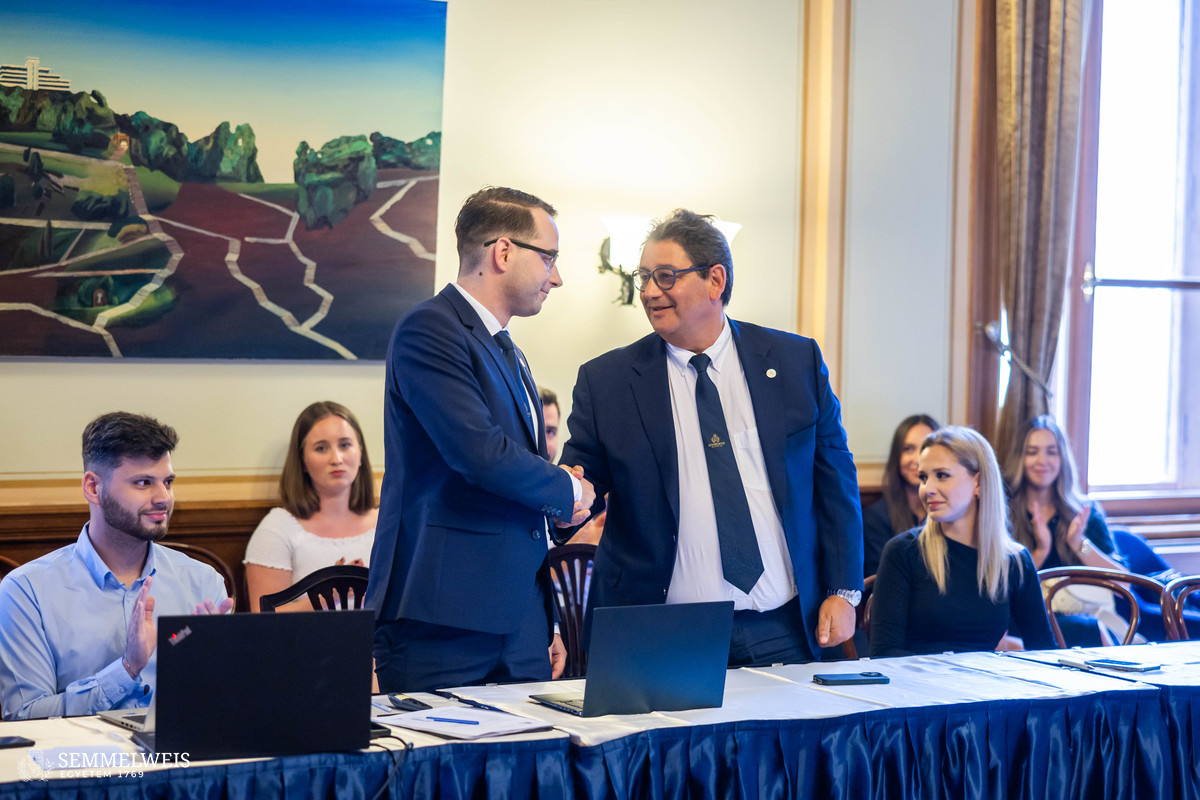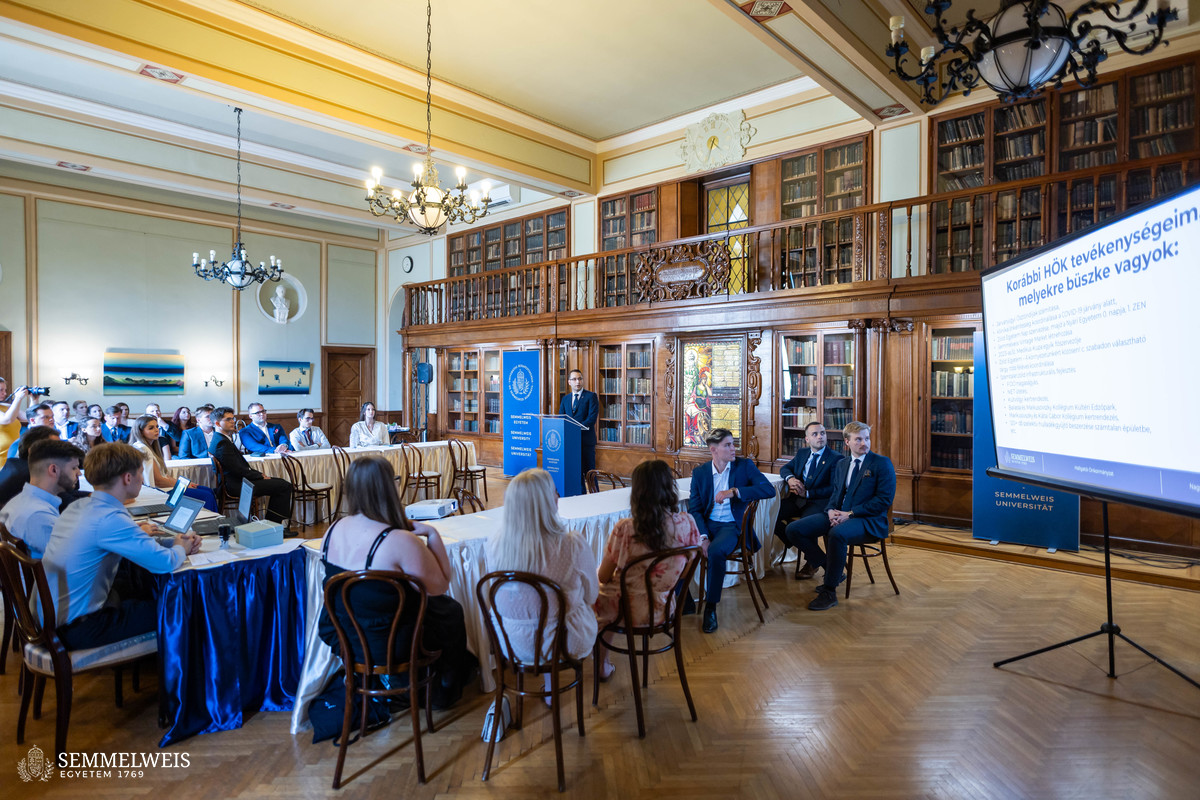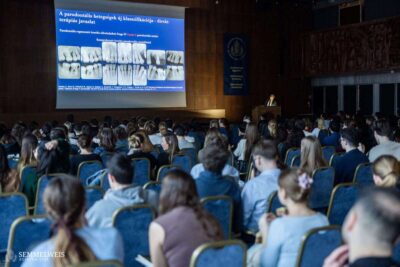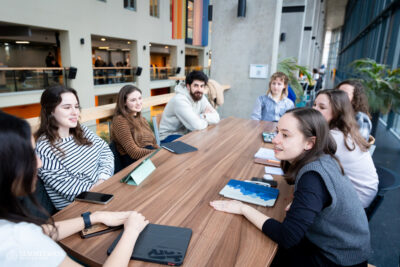Imre Richárd Nagy, the newly elected president of the Students’ Union, is a third-year pharmacy student. He began his studies during the pandemic and quickly became involved in the workings of the Students’ Union, addressing benefits for voluntary work during the pandemic and coordinating clinical volunteers. He first held a position in the Student Welfare Committee. He played an active role in the organization of the 50th Medics’ Cup and the Green University Project. As president, he considers the Green University Day at the Summer University a priority.
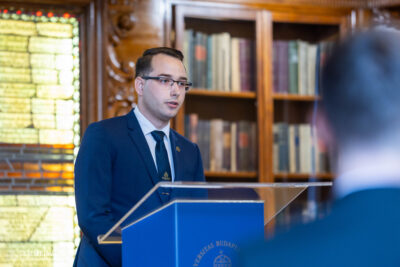 One of his primary goals is to strengthen student representation at the faculty and university levels and improve student satisfaction with HÖK’s work. In this context, he plans to improve the organization’s functioning and efficiency. He places particular importance on involving international students in the Semmelweis community. He also mentioned increasing students’ civil engagement, i.e. raising the next generation of HÖK members, as one of his most important missions. In the future, he would also place more emphasis on supporting students’ mental health.
One of his primary goals is to strengthen student representation at the faculty and university levels and improve student satisfaction with HÖK’s work. In this context, he plans to improve the organization’s functioning and efficiency. He places particular importance on involving international students in the Semmelweis community. He also mentioned increasing students’ civil engagement, i.e. raising the next generation of HÖK members, as one of his most important missions. In the future, he would also place more emphasis on supporting students’ mental health.
In addition to electing a new president and officers, the assembly adopted the organizational changes outlined in the HÖK Statutes. These changes will take effect on September 1, after their expected approval by the Senate at its meeting in August. Due to changes in the organization’s operations and the need for greater efficiency and better representation of students’ changing demands, the position of presidential delegate for strategy and finance was elevated to the level of vice president.
The newly created position of the presidential delegate for mentoring programs aims to support the program by informing students of available opportunities and recommending the most suitable mentoring program for each student, among others. They would also like to strengthen the active dialogue among leaders of the mentoring program to share best practices and strengthen their collaboration with the Institute of Behavioral Sciences and the Institute of Mental Health. According to the president, these institutes can provide the psychological, mental health, and community support essential to students’ well-being and to improving the mentoring program’s professional standards. This position aims to raise students’ awareness of the importance of mental health and connect them with support services and institutional care systems, with a focus on prevention, early intervention, and normalizing the use of professional help.
The new Presidium:
- Secretary: Máté Göndöcs
- General vice president: Renáta Dalma Miklós
- Vice president for education: Máté Szürös
- Vice president for internal administration (from September 1, the position will be called vice president for organization development): István Fejes
- Vice president for events: Enzó Brendon Farkas
- Presidential delegate for strategy and finance (from September 1, the position will be called vice president for strategy and finance): Dániel Dávid Magyar
- Presidential delegate for mentoring programs: Gábor Szabó
- Leaders of the Media Committee: Soma Bence Lernyei and Kristóf Hegedűs
- Leader of the Student Welfare Committee: Petra Gál
- Leader of the Dormitory Committee: Fanni Sárkány
- Leader of the International Students’ Committee: Simon Péter Pásztor
- Green University project leader: László Máté Döngölő
- Students’ head of the András Pető Faculty: Anilla Németh
- Students’ head of the Faculty of Dentistry: Gréta Melitta Nyirády
- Students’ head of the Faculty of Health and Public Administration: Dániel Dávid Magyar
- Students’ head of the Faculty of Health Sciences: Rea Réka Fekete
- Students’ head of the Faculty of Medicine: Petra Tímár
- Students’ head of the Faculty of Pharmaceutical Sciences: Fanni Klaudia Pálfi
Melinda Katalin Kiss
Translation: Judit Szabados-Dőtsch
Photos by Bálint Barta – Semmelweis University
